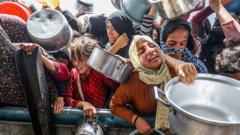Israel's military actions have led to a return to war, which commenced in mid-March after a ceasefire collapsed. The Israeli government has faced pressures from hardline factions within to intensify military operations, with significant consequences for civilians. Philippe Lazzarini, commissioner-general of the UN Relief and Works Agency (UNRWA), has voiced his concerns over the situation, claiming that the blockade is effectively creating starvation conditions among the Gazan populace.
UN data suggests that approximately 470,000 individuals are at a critical risk of famine, with soaring malnutrition rates, especially among children. Despite international calls for humanitarian access and aid, Israeli officials have vehemently denied accusations, asserting that their actions are justified as a means of self-defense following Hamas' violent incursions.
The situation is further complicated by the political context within Israel, where current leadership faces scrutiny and opposition for its approach to Gaza. Critics argue that the continuation of hostilities is primarily driven by political motivations rather than security needs—an assertion underscored by dissenting voices from within the military itself.
UN officials stress the urgent need for global intervention to prevent further escalation and support those suffering in Gaza. Moving forward, it remains to be seen whether diplomatic solutions can alleviate the growing humanitarian disaster unfolding in the region.
In sum, the blockade's denial of essential supplies to Gaza raises serious ethical concerns, with implications that could lead to accusations of genocide, as outlined by various international observers and governments. The humanitarian catastrophe in Gaza requires immediate action and a reassessment of international policy towards the conflict.
In conclusion, the ongoing war has spiraled into an unprecedented humanitarian crisis that is testing the moral and political resilience of the global community.
UN data suggests that approximately 470,000 individuals are at a critical risk of famine, with soaring malnutrition rates, especially among children. Despite international calls for humanitarian access and aid, Israeli officials have vehemently denied accusations, asserting that their actions are justified as a means of self-defense following Hamas' violent incursions.
The situation is further complicated by the political context within Israel, where current leadership faces scrutiny and opposition for its approach to Gaza. Critics argue that the continuation of hostilities is primarily driven by political motivations rather than security needs—an assertion underscored by dissenting voices from within the military itself.
UN officials stress the urgent need for global intervention to prevent further escalation and support those suffering in Gaza. Moving forward, it remains to be seen whether diplomatic solutions can alleviate the growing humanitarian disaster unfolding in the region.
In sum, the blockade's denial of essential supplies to Gaza raises serious ethical concerns, with implications that could lead to accusations of genocide, as outlined by various international observers and governments. The humanitarian catastrophe in Gaza requires immediate action and a reassessment of international policy towards the conflict.
In conclusion, the ongoing war has spiraled into an unprecedented humanitarian crisis that is testing the moral and political resilience of the global community.





















